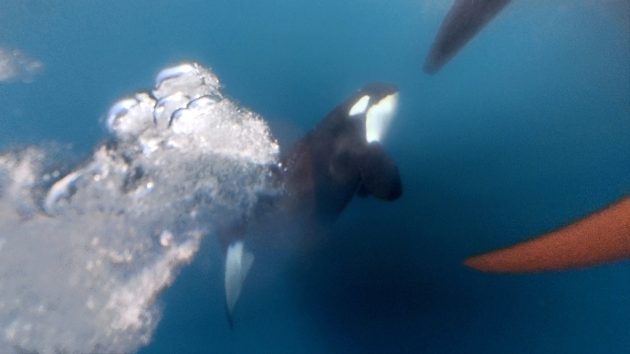Two VO65 yachts racing in The Ocean Race have become the latest boats to face ‘attacks’ by orcas off the Iberian Peninsula after a spate of whale collisions with yachts
Two VO65 yachts racing in The Ocean Race have become the latest boats to face ‘attacks’ by orcas off the Iberian Peninsula.
The two VO65s, Team JAJO and Mirpuri Trifork Racing, were racing in the VO65 Sprint leg to the race finale in Genoa when they were approached by orcas yesterday afternoon between 1-5 miles off the Spanish coast on the approach to Tarifa.
Despite the orcas shoving into the boats, and nudging or biting at the rudders, both VO65s escaped unscathed, and subsequently contacted Race Control to confirm there had been no damage or injuries onboard.
 Watch the video
Watch the video“Twenty minutes ago we got hit by some orcas,” said Team JAJO skipper Jelmer van Beek shortly after the incident.
“Three orcas came straight at us and started hitting the rudders. Impressive to see the orcas, beautiful animals, but also a dangerous moment for us as a team. We took down the sails and slowed down the boat as quickly as possible and luckily after a few attacks they went away… This was a scary moment.”

The Ocean Race VO65 Sprint Cup 2022-23 – 23 June 2023, Stage 3 onboard Team JAJO. Gibraltar Strait Orca encounter.
The attack is of little surprise to sailors who have been monitoring the spate of encounters between orcas and yachts both in the area around Gibraltar and up Portuguese and Spanish Atlantic coasts.
Since the summer of 2020 a pod of whales has been repeatedly swimming up to sailing yachts, aggressively nudging the boats, biting and hitting the rudders and keels. Many yachts have suffered severe damage, and in some incidences – though thankfully limited to a handful cases – the damage has caused the yachts to sink. So far three yachts have sunk off the Iberian coast, fortunately with all crew safely rescued, though encounters have been reported by over 100 other yachts over the past 18 months.
Last month it was revealed that some researchers believe the same female orca, nicknamed ‘White Gladis’, began the pattern of behaviour, which has now been adopted by the local killer whale population. Mature females have the highest status and importance within the whales’ social groups.
Researchers have also identified that a group of juveniles are leading their own attacks. However, scientists studying the whales have no clear answer as to why their behaviour has changed.

In a previous incident, orcas hitting the rudders of a Lagoon 45 catamaran off the Spanish coast. Credit: Halcyon Yachts
Orca attacks spreading?
Until now the incidents have been limited to the Spanish and Portuguese coasts, but earlier this week a sailor reported that his seven-tonne steel yacht had been rammed whilst sailing off Shetland in the North Sea.
Dutch sailor Dr Wim Rutten, a 72-year-old retired physicist, was sailing solo from Lerwick to Bergen in Norway, and was trolling with a single fishing line for mackerel at the time.
He told the Guardian that an orca repeatedly hit the stern of his yacht and swam behind the vessel “looking for the keel. Then he disappeared … but came back at fast speed, twice or thrice … and circled a bit.”
This would be the first reported incident of similar behaviour spreading to other local orca populations. Dr Conor Ryan, a scientific adviser to the Hebridean Whale and Dolphin Trust, who has studied orca pods off the Scottish coast, told the Guardian: “I’d be reluctant to say it cannot be learned from [the southern population]. It’s possible that this ‘fad’ is leapfrogging through the various pods/communities.”

Orcas circle a Sun Odyssey 40 yacht. Photo: Martyn and Zoe Barlow
Pacific sinkings following whale collisions
Entirely unrelated to the spate of attacks by orca whales in the Northern Hemisphere, there have also been two reported sinkings caused by yachts colliding with whales mid-Pacific in the past couple of months.
Just yesterday, eight Danish sailors were rescued by a fishing boat mid-Pacific after their 51ft Beneteau Oceanis Lulu sank following a collision with either one or two whales, the Danish Armed Forces confirmed in a statement on Thursday 22 June.
After abandoning the yacht, the crew took refuge in their liferaft and raised the alarm via sat phone. An international search and rescue co-ordinated by the Joint Rescue Coordination Center in Honolulu, Hawaii saw the crew safely rescued by a fishing vessel before being transferred to a container ship, now headed for Tahiti.
This follows the March rescue of four American sailors, who were also recovered from their liferaft after their Kelly Peterson 44 Raindancer sank rapidly following a collision with a whale 1200 miles from French Polynesia. It’s unknown whether whales intentionally collided with yachts Lulu and Raindancer, or if they are purely coincidental.




